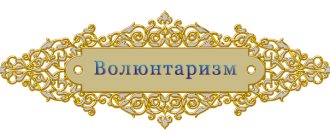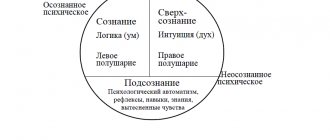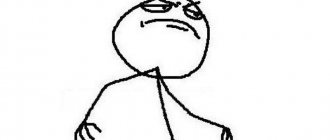InterpretationTranslationDILEMMADILEMMA (Greek dilemma, from dis - double, and lemma - assumption). Reasoning in which the same consequence follows from two opposite assumptions, so that, whichever one is accepted, the result is inevitably the same. Dictionary of foreign words included in the Russian language. - Chudinov A.N., 1910.
DILEMMA1) in logic, the presence of two opposing judgments, which nevertheless lead to the same conclusion; 2) a situation where, in order to achieve Ph.D. the goal has to choose one of two sometimes opposing means.
A complete dictionary of foreign words that have come into use in the Russian language. - Popov M., 1907.
DILEMMA[gr. dilemma< di - twice + lemma - logical premise] - 1) log. a judgment or conclusion containing two mutually exclusive provisions from which one must be chosen; 2) a difficult situation requiring a difficult choice between two unpleasant possibilities; 3) problem.
Dictionary of foreign words. - Komlev N.G., 2006.
DILEMMAGreek. dilemma, from dis, double, and lemma, sentence. A type of dual proof in which a dual proposition that is inevitable for the opponent is inserted between contradictory propositions.
Explanation of 25,000 foreign words that came into use in the Russian language, with the meaning of their roots. - Mikhelson A.D., 1865.
DILEMMA is a proposition consisting of two directly opposite propositions leading to the same conclusion.
Dictionary of foreign words included in the Russian language. - Pavlenkov F., 1907.
dilemma (gr. dilemma di(s) twice + lemma premise) 1) logical conclusion, one of the premises of which is conditional (see hypothetical judgment), and the other is divisive (see disjunctive judgement); 2) trans. having to choose between two (usually undesirable) possibilities.
New dictionary of foreign words. - by EdwART, , 2009.
dilemmas, g. [Greek dilemma – double sentence] (book). 1. A polemical argument consisting in the fact that the opponent is offered a choice of two opposite positions, excluding the possibility of a third. 2. Circumstances that force one to make one of two decisions, the choice between which is extremely difficult. He was faced with a dilemma: either die of hunger or agree to enslaving conditions.
Large dictionary of foreign words. - Publishing house "IDDK", 2007.
dilemma s, g.
(Greek dilēmma < di(s) twice + lēmma premise). 1. philosopher A logical conclusion, one of the premises of which is conditional, and the other is divisive (either-or). 2. A situation in which the choice of one of two opposing solutions is equally difficult.
Facing a difficult dilemma. ||Mid.alternative. Explanatory dictionary of foreign words by L. P. Krysin. - M: Russian language, 1998.
Synonyms
: Other books on request “DILEMMA” >> dilemmanoun
Ushakov's Dictionary
dilemma
dilemma , dilemmas, women.
(
Greek
dilemma - double sentence) (
book
).
1.
A polemical argument consisting in the fact that the opponent is offered a choice of two opposing positions, excluding the possibility of a third.
2.
Circumstances that force one to make one of two decisions, the choice between which is extremely difficult. He was faced with a dilemma: either die of hunger or agree to enslaving conditions.
Philosophical Dictionary (Comte-Sponville)
dilemma dilemma
♦ Dilemma
In the widespread sense of the word, it is a difficult choice between two equally unsatisfactory possibilities. In the strict sense accepted in logic, it is a type of alternative in which both terms lead to the same conclusion, regarded as inevitable. Philosophers, writes, for example, Montaigne, “are always ready with a dilemma that is comforting for a mortal person: either our soul is mortal or immortal. If she is mortal, then there will be no punishment for her; if she is immortal, it means that she will become better and better” (“Essays”, book II, chapter 12; see also: Pascal, “Penciles”, 409–220). The conclusion from here is the same - there is nothing to be afraid of death. It is easy to see that a dilemma is worth as much as its conclusions. Where is the proof, asks Montaigne, that after death the soul will become better and not worse?
The dilemma is...
According to most academic dictionaries:
A dilemma is an argument, position, assumption, or a special form of inference limited to only two mutually exclusive premises (that is, a choice when “there is no third option”).
This is directly evidenced by the very origin of the word dilemma, due to the fusion of two Greek stems - “diz” and “lemma” (“double, twice” and “opportunity, proposal, premise”).
In common usage, a dilemma refers to a situation that can only be resolved in one of two possible ways, both of which are equally problematic or undesirable.
Then the choice is made according to the principle of “lesser evil”. It is in this nuance that the inaccuracy of using this word lies: not a choice from just two solutions, but a choice, so to speak, from two evils.
Formal logic leads us into even denser jungle, which calls lemmas conditionally divisive (or opposite) conclusions that act as arguments, judgments or available solutions.
In this case, the dividing premise itself can contain both two components - and then we are talking about a dilemma - and three (trilemma) or more (polylemma) components.
It is interesting how this segment of analytical science presents the definition of a dilemma. Here there is still a limitation of two options, but the choice between them is given extremely insignificant importance.
It goes something like this: Since each option leads to the same conclusion, the choice between A and B, regardless of the meaning of each, is completely unimportant.
What is a dilemma?
All people face dilemmas. For example, if there is a limited amount of money, everyone in a store has to give up one thing in order to buy another. However, if in a store you have to solve a dilemma instantly, no matter how sad it may be to put the desired products out of the basket, then in life a person may not solve some issue for months, waiting for a good opportunity or even letting everything take its course.
What is a dilemma? This is a problem that a person needs to consciously solve, choosing between two equivalent and equally important options that exclude each other. In simple words, this can be represented as a person finding himself at a crossroads, where he needs to unambiguously decide whether he will go right or left. There is no third option that could include the previous two, which is the essence of the dilemma. You need to go either right or left, which will lead to the following:
- To the refusal of another option for solving the problem. A person, choosing the first option, refuses the second, as well as vice versa: when choosing the second option, he refuses the first.
- To obtain certain consequences. The person has probably already thought about what kind of future will come when he prefers one or another solution to the problem. Moreover, each option offers its own future, which will not be realized if you choose another solution option.
- To receive certain deprivations. Why did the dilemma arise? Because the person realized that if he chose one of the options, he would be deprived of certain privileges that he was given when choosing another option. If a girl chooses a rich man, then she will lose love, and if she chooses a beloved man, then she will live in poverty. The choice becomes painful, since the girl wants to live in both love and wealth. However, the options she has do not allow her to achieve what she wants.
- To receive certain benefits. Behind every solution to a problem there is a certain benefit that a person cannot refuse. The choice would be easy if a person did not see anything important and useful for himself behind some option. However, the dilemma arises when both mutually exclusive options provide him with certain goods that, from his point of view, are equivalent.
All people face dilemmas. Here we can remember that a person is periodically forced to decide whether to follow his desires or live according to the norms of society. Not every behavior is rewarded by society, but it can achieve the desired goal. What will a person choose in this case?
Do you like other people or live the way you want, but at the same time learn to receive love and support only from yourself and some individuals who also agree with this way of life? To be a social person and adapt to those around you, or to live for your own pleasure, having only a limited circle of like-minded people? A person is constantly forced to solve dilemmas where options are mutually exclusive and provide certain benefits that are difficult to refuse.
In psychology, the dilemma is of some interest because it is about a problem where the solution options do not provide complete satisfaction and happiness. You can often hear here that there is no need to make a choice, but that it is better to find a solution to the problem that would fully satisfy a person’s needs. However, such situations rarely occur. Often a person faces a dilemma where, when choosing one of the options, he is deprived of the privileges of the second decision and faces certain difficulties that would not arise if he made a different decision (however, with a different decision there would be difficulties that would not arise when choosing first decision).
Thus, a dilemma is a problem in which:
- A person cannot fully satisfy his needs, otherwise the issue would be resolved very quickly.
- A person is forced to choose which goods to give up in order to acquire other goods.
- A person is forced to choose which difficulties to face in order not to face other problems.
- A person is forced to choose what kind of future to build, while it will be deprived of the privileges that he could have had if he had chosen a different solution.
Dilemma - subtleties of scientific interpretation
First, let's clarify about conditionally separative inferences. These are lemmatic inferences (judgments, assumptions) with premises of a certain type: one of them is a disjunctive judgment, and the rest are conditional alternatives, of which there can be two or more.
In dilemmas, as we have already found out, there are only two premises and, despite their meaning, both lead to the same conclusion (consequence).
As for the types of dilemmas, there are only four of them - two main types, which can occur in both simple and complex forms:
- constructive is a creative dilemma in which both terms (both premise and conclusion) are clothed in the form of an affirmative judgment;
- destructive – it is also destructive when the premise and conclusion are presented as negative judgments.
In simple forms of dilemmas, simple propositions act as the conclusion, and both grounds and consequences act as a common element for the conditional premises.
In complex forms, the judgment is also complex, but there is nothing common in the conditional premises - that is, as many reasons as there are in the dilemma, so many consequences can be in it.
The basic principle of lemmatic inferences can be formulated in a simplified way: the conclusion will be legitimate if the direction of reasoning tends from confirming/denying the legitimacy of the grounds to confirming/denying the legitimacy of the consequences.
The most famous dilemmas
Polylemmas in general are characterized by one more regularity: reasoning carried out in search of a conclusion can be directed not only from general knowledge to a particular phenomenon, but also vice versa - from specific knowledge to a general consequence.
On this principle, in particular, deductive thinking is built, which plays a significant role in the overall picture of our mental activity.
If we allow another simplification, then any dilemma can be interpreted as a certain moment in a critical or conflict situation, when a person is forced to make a choice in favor of one of two possibilities, and both decisions are equally unfavorable for him.
There is probably no point in going deeper into the situational diversity, but it is definitely worth considering a few of the most well-known dilemmas:
- The Euthyphro Dilemma is a double problem in Christianity, formulated by Plato (IV century BC) and named after the main character in most of the philosopher’s dialogues. The crux of the question concerns the nature of goodness: does God choose goodness for its goodness, or is goodness goodness because it is chosen by God?
- The prisoner's dilemma is a conceptual technique in game theory designed to illustrate situational options. It is used in philosophy, analytics, psychology, when there is a need to find out the reasons why someone acts this way and not otherwise.
The gist: the police don't have enough evidence for two accomplices arrested for a crime, so a confession is needed. Then the investigators make a separate offer to each of them - if he surrenders his partner first, he will be released.The question is, what does each prisoner think and how does he try to predict whether his partner will remain silent or speak out in order to gain freedom? However, look at how YouTube experts present this topic:
» alt=»»>
- A moral dilemma is an ethical (sometimes moral) problem that arises in acute situations and requires an immediate solution associated with the violation of moral principles or ethical regulations.
» alt=»»> This choice is most often faced by professionals - politicians, military personnel, doctors, firefighters, police officers, etc. In everyday life, everything is somewhat simpler, but in any case, the decision made is burdened with a negative feeling - guilt, remorse or regret. - A false dilemma is an erroneous conclusion drawn from two alternatives, one of which is rejected as invalid, and the second is accepted as true because the first is unacceptable.
- Morton's Fork is a situation with the need to choose one of two unpleasant alternatives, equally undesirable and unfavorable for the one who is forced to make a decision (read more about this type of dilemma below).
Interestingly, to solve some dilemmas, there are even recommendations to make the choice easier.
Experts advise that the first step is to soberly analyze the situation and try to logically refute the paradox (some kind of contradiction).
If this fails and the need for choice remains, you need to focus on analyzing the possibilities and finding additional alternatives. Then soberly evaluate the decision that promises you the least negative consequences, and choose it.
Excerpt characterizing the dilemma
And since the French Revolution, the old group, not great enough, is destroyed; old habits and traditions are destroyed; a group of new sizes, new habits and traditions are developed, step by step, and the person who must stand at the head of the future movement and bear all the responsibility of what is to come is being prepared. A man without convictions, without habits, without traditions, without a name, not even a Frenchman, by the most strange accidents, it seems, moves among all the parties that worry France and, without attaching himself to any of them, is brought to a prominent place. The ignorance of his comrades, the weakness and insignificance of his opponents, the sincerity of the lie and the brilliant and self-confident narrow-mindedness of this man put him at the head of the army. The brilliant composition of the soldiers of the Italian army, the reluctance of his opponents to fight, his childish audacity and self-confidence gain him military glory. Countless so-called accidents accompany him everywhere. The disfavor into which he falls from the rulers of France serves to his advantage. His attempts to change the path destined for him fail: he is not accepted into the service in Russia, and he fails to be assigned to Turkey. During the wars in Italy, he is on the verge of death several times and is saved each time in an unexpected way. Russian troops, the very ones that could destroy his glory, for various diplomatic reasons, do not enter Europe as long as he is there. On his return from Italy, he finds the government in Paris in that process of decay in which the people who fall into this government are inevitably erased and destroyed. And for him there is a way out of this dangerous situation, consisting of a meaningless, causeless expedition to Africa. Again the same so-called accidents accompany him. Impregnable Malta surrenders without a shot; the most careless orders are crowned with success. The enemy fleet, which does not let a single boat through, lets through an entire army. In Africa, a whole series of atrocities are committed against almost unarmed inhabitants. And the people who commit these atrocities, and especially their leader, convince themselves that this is wonderful, that this is glory, that this is similar to Caesar and Alexander the Great, and that this is good.
"The Dilemma" by Oscar-winner Ron Howard
We're talking about 2011's Dilemma, starring the charming "ring fat man" Kevin James and the charismatic "master of comedy drama" Vince Vaughn. Some experts from the world of cinema agree that the film, which did not receive widespread recognition, has definitely remained underrated.
And, paradoxically, it was Ron Howard himself who was considered to blame, who had the imprudence to create such commercially successful films as “A Beautiful Mind,” “Apollo 13,” “The Da Vinci Code,” “Race,” “Knockdown,” “Changeling,” “Inferno”, etc. It’s just that against the backdrop of this elite flower garden, “Dilemma” looks no brighter than a modest field chamomile.
Nevertheless, despite the comedy genre, the film really makes you think, and in the context of our topic today, it also perfectly illustrates what a dilemma is.
In this case, the long-term friendship of two talented men is under threat. The wife of one of them, Genevieve, began an affair with a young blockhead, Zip, and this became known to Ronnie, who once, many years ago, himself dated Genevieve.
And now Ronnie is going through all the circles of hell, trying to decide whether to tell his friend Nick this terrible truth or is it better to leave everything as it is?
The trouble is that both exposure and silence are fraught with a lot of problems not only for the friends themselves, but also for their joint business with brilliant prospects.
You can find out how this dilemma was resolved by watching the film, and rest assured that your time will definitely not be wasted.
Good luck to you! See you soon on the blog pages KtoNaNovenkogo.ru
Comments and reviews (2)
«>
I can offer a very simple way out of the dilemma, you just need to throw a coin, in other words, surrender to chance. After all, any choice is still bad, so is it worth spending time deciding between good and bad?
«>
The prisoner's dilemma is a rather old trick, absolutely everyone already knows about it, I think it’s stupid to use it in modern realities, unless of course we are talking about someone who stole 2 chickens and 3 geese on the night after a rain on Thursday in the outback of Russia, and so usually the most big deals should discuss in advance what they will do if such a situation occurs.
Sources used:
- https://dic.academic.ru/dic.nsf/dic_fwords/10148/dilemma
- https://znachenie-slova.ru/dilemma
- https://ru.m.wiktionary.org/wiki/dilemma
- https://wikifin.ru/chto-takoe-dilemma-prostymi-slovami-dlya-shkolnikov-kratko/
- https://ktonanovenkogo.ru/voprosy-i-otvety/dilemma-chto-ehto-takoe.html
Dilemma of choice
Dilemma of choice: to believe or not to believe?
Sooner or later, every thinking person asks the question whether there is a God.
Unfortunately, hardly anyone will ever be able to find out for sure. Therefore, for several centuries now, the existence of an omniscient and omnipotent being has been the subject of heated debate in completely different circles. Blaise Pascal (1623 – 1662) approached this problem in an interesting way.
.
With his characteristic scientific rationalism, he resolved the issue of faith from the position of benefit. In his philosophical work “Thoughts on Religion and Other Things,”
he decreed:
.
” The solution to the eternal dilemma he proposed was called "Pascal's Wager"
.
What is the essence of Pascal's wager?
In "Thoughts on Religion and Other Things"
Blaise Pascal poses the question this way:
God exists or not. Which side will we lean on? Reason cannot solve anything here. We are separated by endless chaos. On the edge of this infinity, a game is played out, the outcome of which is unknown. What will you bet on?
According to the scientist, the probability of God's existence is equal to the probability of his absence. In a situation where there is a God, the following options are possible :
- Believe in God and live according to the canons of faith, then: you receive eternal bliss, but you must observe various restrictions, keep fasts and perform rituals
- Don't believe in God, then: there is no need to waste your money, time and patience on observing restrictions, but you are damned forever
Thus, it is more profitable to believe in God, because if there is one, you get the salvation of your soul
, and if it’s not there, you don’t lose anything.
If you don't believe in God, but it turns out that he exists, you will face eternal torment
. If you are right and it is not there, then nothing changes for you. No matter how incredible the existence of God may seem, the price in case of a “wrong answer” is too high.
Pascal himself explains his decision as follows:
What are you risking by making this choice? You will become a loyal, honest, humble, grateful, good-doing person, capable of sincere, true friendship. Yes, of course, base pleasures will be ordered for you - fame, voluptuousness - but won't you get anything in return? I tell you, you will win a lot even in this life, and with each step along your chosen path, the gain will become more and more certain for you and everything against which you bet on the undoubted and infinite, without sacrificing anything, will become increasingly insignificant.
Arguments against Pascal's Wager
Surprisingly, both atheists and believers agreed in their criticism of Pascal’s Wager. Some are dissatisfied with the abstractness of the argument, while others are dissatisfied with the path that the mathematician chose to justify the need to believe. In general, the main arguments against are:
- the necessity of faith cannot be proven through mathematics
- it is not clear who to pray to: Pascal's Wager justifies belief in any religion that promises an eternal afterlife. But which of the many religions is true? You can make a mistake when choosing: what to believe, who to pray to. Believing in a wrong religion can produce the same result as not believing in any religion
- You cannot believe by choice, you cannot follow the canons of faith, like the articles of the Civil Code
- any superstition can be justified in a similar way
The contribution of Pascal's choice dilemma to the question of faith
It is clear that Pascal's wager was a response to the challenge of the times. The new era in which the scientist lived became a period when science separated from the church, and biblical criticism and the idea that everything that was said in it gradually began to spread. It was during this era that atheism became a philosophical position. Where there is unbelief, there is also a need to strengthen faith in something. Blaise Pascal took on this task. His hypothesis did not satisfy either believers or atheists, but subsequently gave impetus to the development of philosophical thought, and this is already a lot.










